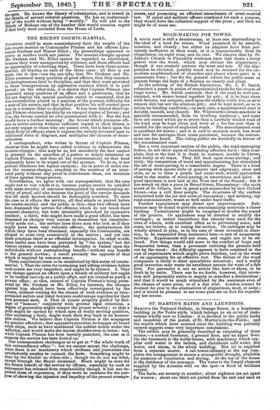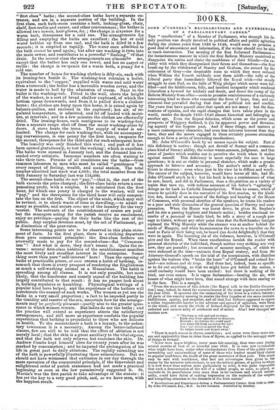ST. MARTIN'S BATHS AND LAUNDRIES.
BEHIND the National Gallery, in Orange Street, is a handsome building in the Tudor style, which belongs to an order of insti- tutions wholly new to London: it is devoted to the public baths and laundries of the parish of St. Martin's-in-the-Fields ; and the results which have accrued since the building was partially opened suggest some very important conclusions.
The edifice may be generally described as consisting of three stories,—a sunken basement, a ground floor, and an upper floor. On the basement is the boiler-house, with machinery which sup- plies cold water to the boilers, and distributes cold water, hot water, and steam, to the whole building. Hot air is supplied from a separate source. A tall tower-chimney at the top com- pletes the arrangement to secure a manageable draught, available for purposes of ventilation and drying. At the top of the house is the residence of the manager. The water is the limpid element supplied by the Artesian well on the spot—a flood of brilliant crystal. The baths are seventy in number ; about eighteen are set apart for women ; about one third are parted from the rest and used as "first class" baths ; the second-class baths have a separate en- trance, and are in a separate portion of the building. In the first class, each bath-room contains a bath, looking-glass, chair, shelf, foot-trellis and carpet, and other conveniences; the bather• is allowed two towels, hair-gloves, &c. ; the charge is sixpence for a warm bath, threepence for a cold one. The arrangements for filling and emptying the baths are excellent : the hot or cold water bubbles up from one end, and the bath is filled in a few seconds; it is emptied as rapidly. The water once admitted to the bath cannot be used again; but after one washing it runs into the main sewer, and contributes to a powerful " flushing " of that drain. In the second class the arrangements are almostthe me, except that the bather has only one towel, and has no carpet or trellis : the charge is twopence for a warm bath, a penny for a cold one.
The number of boxes for washing clothes is fifty-six, each with its ironing-box beside it. The washing-box contains a boiler, equivalent to the "copper," supplied with warm and cold water from a turncock ; the boiler has a moveable wooden cover, and the water is made to boil by the admission of steam. Next to the boiler is the washing-tub. Fitted to the wall, above the height of the washer, is a sort of broad shallow cupboard, of which the bottom opens downwards, and from it is pulled down a clothes- horse ; the clothes are hung upon this horse, it is raised again by balance-pullies, and enclosed in the cupboard; hot air, of re- gulated temperature, is admitted, and let off loaded with moist- ure, at intervals ; and in a few minutes the clothes are effectually dried. The ironing-boxes, each contiguous to its washing-box, form a separate range shut off from the moist washing-place by doors. A stove heats the irons. The supply of water is un- limited. The charge for each washing-box, with its accompany- ing conveniences, is one penny for the first hour, twopence for the second, threepence for the third and for each subsequent hour. The laundry was only finished this week ; and part of it has been opened gratuitously, to test the working ; which is excellent. The baths were opened in January last, and the demand has ex- ceeded every estimate. Immense numbers are often waiting to take their turn. Persons of all conditions use the baths—from common labourers to men who must be called " gentlemen " in every respect of feeling, wealth, and social station. The total number admitted last week was 4,083; the total number from the 24th January to Saturday last was 154,000.
The second-class baths do not "pay,"—that is, the cost of the bath exceeds the price charged ; the first-class baths return a com- pensating profit, with a surplus. It is calculated that the first hour, for which one penny is charged to the washer, will not "pay," and the threepence for the third hour will only compen- sate the loss on the first. The object of the scale, which may still be revised, is to check waste of time in dawdling,—to admit as many as possible, and secure some use of the laundry for the very noorest. The servants of the establishment of course are paid; but the managers acting for the parish receive no emolument, enjoy no privilege—paying for their baths like the rest of the public. Any surplus revenue must, by the act of Parliament, go in diminution of the poor-rates. Some interesting points are to be observed in this plain state- ment of facts. In the first place, there is a striking departure from pure commercial principles : the first-class bathers are avowedly made to pay for the second-class—flat "Commun- ism"! And what is more, they don't resent it. Quite the re- verse : several first-class habitues of the establishment manifest the most lively and steadfast interest in the enterprise. Some- thing more than pure " self-interest" here I Then the opening of baths at practicable prices, at once creates a habit of bathing, in- somuch that there is every prospect of rendering the Englishman as much a self-washing animal as a Mussulman. The habit is spreading among all classes. It is not only possible, but most likely, that the handsome and comely aspect of the building has largely contributed to that result : it has no pauper look about it, nothing repulsive or humbling. Physiological writings of a popular kind have helped, and the experience of the bathers will corroborate the counsel of such works. The women as yet use the baths in a very small proportion ; a fact to be imputed partly to the timidity and reserve of the sex, uncertain how far the arrange- ments may be perfectly pleasant—partly also to the greater igno- rance in which women remain. But ladies do use the baths ; and the practice will extend as experience attests the satisfactory, arrangements, and still more as experience confutes the popular superstition that bathing is prejudicial to those who are delicate in health. To the mountaineer a bath is a luxury, to the seden- tary townsman it is a necessity. Among the better-informed classes, few are still to be told that the effect of ablution is not merely local; that the skin is a great auxiliary to the vital organs, and that the bath not only relieves but exercises the skin. Dr. Andrew Combe kept himself alive for twenty years after he was marked by consumption ; and he imputed the prolongation of his life in great part to daily ablutions. The rapidly extending use of the bath is powerfully illustrating these admonitions. But we should not have witnessed that extension in our day through the mere operation of the commercial principle, if the benevolent and enlightened order of parish statesmen had not made a practical beginning as soon as the law permissively suggested it. St. Martin's was the first parish to take advantage of the statute : it has set the key to a very good pitch, and, as we have seen, with the happiest result.



























 Previous page
Previous page